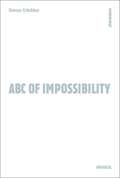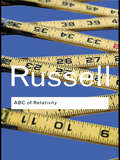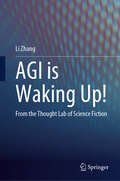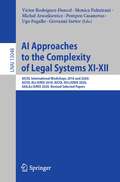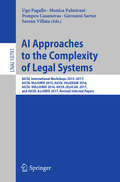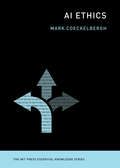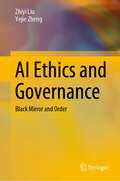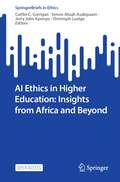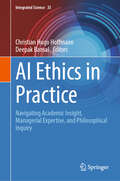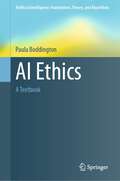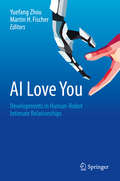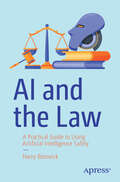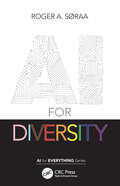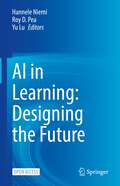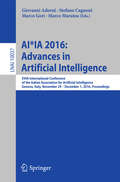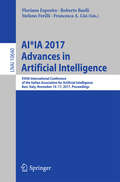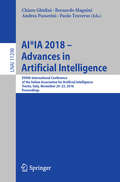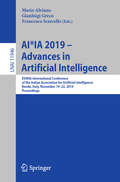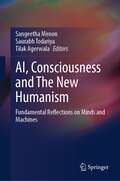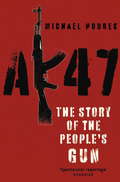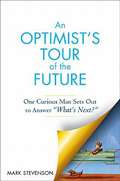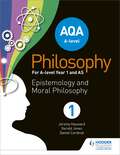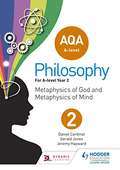- Table View
- List View
ABC of Impossibility (Univocal)
by Simon CritchleyHow does one write an experimental ABC, an impossible theory that would deal with a series of phenomena, concepts, places, sensations, persons, and moods? A para-philosophy? Returning to a once-abandoned project of fragmented thoughts where the author&’s voice moves from the serious to the pathetic, to the absurd, to the cynical, Simon Critchley&’s ABC of Impossibility finds new life in the form of this small encyclopedic and aphoristic text where the reader bears witness to the slow emergence of an attempt at a poetic ontology. ABC of Impossibility is a unique undertaking that reexamines the poetic site of the fragment as thought. Following a heritage of fragmented, aphoristic thinkers including Pascal, Nietzsche, Kierkegaard, and Pessoa, Critchley revitalizes a para-philosophical thinking that can only be uttered by way of another. As he declares in the opening pages, &“In writing this, I promise to tell the truth, but not to be myself.&”
ABC of Relativity
by Bertrand RussellFirst published in 1925, Bertrand Russell’s ABC of Relativity was considered a masterwork of its time, contributing significantly to the mass popularisation of science. Authoritative and accessible, it provides a remarkable introductory guide to Einstein’s theory of Relativity to a general readership. One of the most definitive reference guides of its kind, and written by one of the twentieth century’s most influential philosophers, ABC of Relativity continues to be as relevant today as it was on first publication.
AGI is Waking Up!: From the Thought Lab of Science Fiction
by Li ZhangThis book is an engaging and comprehensive exploration that delves into the possibility of artificial intelligence developing self-awareness, the conditions under which it may occur, and the potential behaviours it may exhibit once self-aware. It adopts a &‘high-dimensional philosophy&’, coined by the author, as its theoretical framework and weaves together elements from science fiction films, scholarly works, and thought experiments. Introducing the captivating concept of "Sparkling Moments," the book provides a compelling analysis of the reasons, prerequisites, and manifestations of these pivotal moments. It further scrutinizes the evolutionary history of Earth's life forms through the lens of these transformative instances and analyzes the similarities and differences between carbon-based and silicon-based life. This book suggests that it is possible for artificial intelligence to develop self-consciousness, which will emerge during a significant sparkling moment. Spanning across disciplines such as astronomy, physics, chemistry, biology, neuroscience, psychology, sociology, this book employs a unified and accessible high-dimensional philosophical discourse to bridge the realms of natural sciences and social humanities. Its captivating presentation, enriched with visual aids and lucid explanations, enables readers to grasp the overarching panorama of cosmic evolution, biological adaptation, and the trajectory of artificial intelligence development. Furthermore, the book offers insightful predictions for the future and endeavours to discover novel approaches to foster harmonious interactions between humans and machines. The translation was done with the help of artificial intelligence. A subsequent human revision was done primarily in terms of content.
AI Approaches to the Complexity of Legal Systems XI-XII: AICOL International Workshops 2018 and 2020: AICOL-XI@JURIX 2018, AICOL-XII@JURIX 2020, XAILA@JURIX 2020, Revised Selected Papers (Lecture Notes in Computer Science #13048)
by Ugo Pagallo Giovanni Sartor Michał Araszkiewicz Pompeu Casanovas Monica Palmirani Víctor Rodríguez-DoncelThis book includes revised selected papers from the International Workshops on AI Approaches to the Complexity of Legal Systems, AICOL-XI@JURIX2018, held in Groningen, The Netherlands, on December 12, 2018; AICOL-XII@JURIX 2020, held in Brno, Czechia, on December 9, 2020; XAILA@JURIX 2020, held in in Brno, Czechia, on December 9, 2020.*The 17 full and 4 short papers included in this volume were carefully reviewed and selected form 39 submissions. They represent a comprehensive picture of the state of the art in legal informatics. The papers are logically organized in 5 blocks: Knowledge Representation; Logic, rules, and reasoning; Explainable AI in Law and Ethics; Law as Web of linked Data and the Rule of Law; Data protection and Privacy Modelling and Reasoning.*Due to the Covid-19 pandemic AICOL-XII@JURIX 2020 and XAILA@JURIX 2020 were held virtually.
AI Approaches to the Complexity of Legal Systems: International Workshops Aicol-i/ivr-xxiv, Beijing, China, September 19, 2009 And Aicol-ii/jurix 2009, Rotterdam, The Netherlands, December 16, 2009 Revised Selected Papers (Lecture Notes in Computer Science #6237)
by Ugo Pagallo Giovanni Sartor Pompeu Casanovas Monica Palmirani Serena VillataThis book includes revised selected papers from five International Workshops on Artificial Intelligence Approaches to the Complexity of Legal Systems, AICOL VI to AICOL X, held during 2015-2017: AICOL VI in Braga, Portugal, in December 2015 as part of JURIX 2015; AICOL VII at EKAW 2016 in Bologna, Italy, in November 2016; AICOL VIII in Sophia Antipolis, France, in December 2016; AICOL IX at ICAIL 2017 in London, UK, in June 2017; and AICOL X as part of JURIX 2017 in Luxembourg, in December 2017.The 37 revised full papers included in this volume were carefully reviewed and selected form 69 submissions. They represent a comprehensive picture of the state of the art in legal informatics. The papers are organized in six main sections: legal philosophy, conceptual analysis, and epistemic approaches; rules and norms analysis and representation;legal vocabularies and natural language processing; legal ontologies and semantic annotation; legal argumentation; and courts, adjudication and dispute resolution.
AI Ethics (The MIT Press Essential Knowledge series)
by Mark CoeckelberghAn accessible synthesis of ethical issues raised by artificial intelligence that moves beyond hype and nightmare scenarios to address concrete questions.Artificial intelligence powers Google's search engine, enables Facebook to target advertising, and allows Alexa and Siri to do their jobs. AI is also behind self-driving cars, predictive policing, and autonomous weapons that can kill without human intervention. These and other AI applications raise complex ethical issues that are the subject of ongoing debate. This volume in the MIT Press Essential Knowledge series offers an accessible synthesis of these issues. Written by a philosopher of technology, AI Ethics goes beyond the usual hype and nightmare scenarios to address concrete questions.Mark Coeckelbergh describes influential AI narratives, ranging from Frankenstein's monster to transhumanism and the technological singularity. He surveys relevant philosophical discussions: questions about the fundamental differences between humans and machines and debates over the moral status of AI. He explains the technology of AI, describing different approaches and focusing on machine learning and data science. He offers an overview of important ethical issues, including privacy concerns, responsibility and the delegation of decision making, transparency, and bias as it arises at all stages of data science processes. He also considers the future of work in an AI economy. Finally, he analyzes a range of policy proposals and discusses challenges for policymakers. He argues for ethical practices that embed values in design, translate democratic values into practices and include a vision of the good life and the good society.
AI Ethics and Governance: Black Mirror and Order
by Zhiyi Liu Yejie ZhengThis book deeply analyzes the theoretical roots of the development of global artificial intelligence ethics and AI governance, the ethical issues in AI application scenarios, and the discussion of artificial intelligence governance issues from a global perspective. From the perspective of knowledge, the book includes not only the metaphysical research of traditional Western ethics, but also the interpretation of AI-related practical cases and international policies. The purpose of this book is not only to study AI ethics and governance issues academically, but to seek a path to solve problems in the real world. It is a very meaningful monograph in both academic theory and reality. This book responds to the implementation of China's digital economy governance and other topics. It is a cutting-edge academic monograph that combines industry, policy, and thought.In this book, the author not only discusses the humanities thoughts such as ethics, political economy, philosophy, and sociology, but also involves computer science, biology, and medicine and other science and engineering disciplines, effectively using interdisciplinary thinking as readers clarify how to explore ethical consensus and establish smart social governance rules in the era of artificial intelligence, so as to provide the most comprehensive and unique scientific and technological insights for smart economy participants, related practitioners in the artificial intelligence industry, and government policy makers. For academia, this is a representative book of Chinese scholars' systematic thinking on AI ethical propositions from a global perspective. For the industry, this is a book that understands the policies and ethical propositions faced by the development of AI industry. An important reference book, for policy makers, this is a monograph for understanding how policies in the AI industry make decisions that conform to AI industry practices and people's moral order.
AI Ethics in Higher Education: Insights from Africa and Beyond (SpringerBriefs in Ethics)
by Christoph Luetge Caitlin C. Corrigan Simon Atuah Asakipaam Jerry John KponyoThis open access book tackles the pressing problem of integrating concerns related to Artificial Intelligence (AI) ethics into higher education curriculums aimed at future AI developers in Africa and beyond. For doing so, it analyzes the present and future states of AI ethics education in local computer science and engineering programs. The authors share relevant best practices and use cases for teaching, develop answers to ongoing organizational challenges, and reflect on the practical implications of different theoretical approaches to AI ethics. The book is of great interest to faculty members, researchers, and students in the fields of artificial intelligence, computer science, mathematics, computer engineering, and related areas, as well as higher education administration.
AI Ethics in Practice: Navigating Academic Insight, Managerial Expertise, and Philosophical Inquiry (Integrated Science #35)
by Christian Hugo Hoffmann Deepak BansalThis book takes us on an in-depth exploration of the evolving intersection between artificial intelligence and ethical considerations. As AI applications extend far beyond technology giants, a robust ethical debate unfolds, addressing issues of discrimination, democracy, and due process. Tech startups, often lacking corporate governance and legal expertise, become central figures in this narrative, facing unique uncertainties. Grounded in applied ethics, this collaborative work between experts from practice and academia investigates responsible tech entrepreneurship, also helping lay practical foundations for startups. Providing diagnostic tools and frameworks, the book is tailored for academics, researchers, and professionals navigating the ethical dimensions of AI in organizational settings. Going beyond managerial insights, the narrative takes a philosophical turn, contemplating not just the capabilities but the ethical responsibilities of AI. Rooted in effective altruism and conceptual analyses, this book serves as a critical resource for those seeking informed, ethical decision-making in the rapidly evolving technological landscape.
AI Ethics: A Textbook (Artificial Intelligence: Foundations, Theory, and Algorithms)
by Paula BoddingtonThis book introduces readers to critical ethical concerns in the development and use of artificial intelligence. Offering clear and accessible information on central concepts and debates in AI ethics, it explores how related problems are now forcing us to address fundamental, age-old questions about human life, value, and meaning. In addition, the book shows how foundational and theoretical issues relate to concrete controversies, with an emphasis on understanding how ethical questions play out in practice. All topics are explored in depth, with clear explanations of relevant debates in ethics and philosophy, drawing on both historical and current sources. Questions in AI ethics are explored in the context of related issues in technology, regulation, society, religion, and culture, to help readers gain a nuanced understanding of the scope of AI ethics within broader debates and concerns. Written with both students and educators in mind, the book is easy to use, with key terms clearly explained, and numerous exercises designed to stretch and challenge. It offers readers essential insights into the evolving field of AI ethics. Moreover, it presents a range of methods and strategies that can be used to analyse and understand ethical questions, which are illustrated throughout with case studies.
AI Love You: Developments in Human-Robot Intimate Relationships
by Martin H. Fischer Yuefang ZhouUsing an interdisciplinary approach, this book explores the emerging topics and rapid technological developments of robotics and artificial intelligence through the lens of the evolving role of sex robots, and how they should best be designed to serve human needs. An international panel of authors provides the most up-to-date, evidence-based empirical research on the potential sexual applications of artificial intelligence. Early chapters discuss the objections to sexual activity with robots while also providing a counterargument to each objection. Subsequent chapters present the implications of robot sex as well as the security and data privacy issues associated with sexual interactions with artificial intelligence. The book concludes with a chapter highlighting the importance of a scientific, multidisciplinary approach to the study of human - robot sexuality. Topics featured in this book include: The Sexual Interaction Illusion Model. The personal companion system, Harmony, designed by Realbotix™. An exposition of the challenges of personal data control and protection when dealing with artificial intelligence. The current and future technological possibilities of projecting three-dimensional holograms. Expert discussion notes from an international workshop on the topic. AI Love You will be of interest to academic researchers in psychology, robotics, ethics, medical science, sociology, gender studies as well as clinicians, policy makers, and the business sector.
AI and the Law: A Practical Guide to Using Artificial Intelligence Safely
by Harry BorovickLearn how to maximize your use of, and benefit from AI, personally and professionally while staying safe. To satisfy professionals and businesses trying to modernize their approaches to work and personal tasks, this book will explain some of the basics of what AI is, what AI is likely to look like in the near future, and how not to get stung using it. You’ll quickly realize that AI isn’t coming, it’s here, along with its opportunities and challenges. While some of the advantages of using AI tools may seem too good to be true, you’ll discover that the key to navigating the early stages of the AI era is to understand its guiding principles and then to prioritize the guidelines. The book features general situations and use cases to help you experience AI for fun and for work while retaining the benefits, profits, creations, outputs, and efficiencies of it. If you’re going to use AI in your daily career, whether as a student, creative, executive, marketer or in sales this book will help you understand how to bypass obstacles and get value from AI with the guidance of an AI and tech lawyer. What You Will Learn Identify, debunk, and protect against business and legal risk in the AI eraDiscuss these issues on a high level with CTOs and COOsSee how professionals can mutually use AI to their benefit Who This Book is For Anyone who wants to know whether AI is really going to change the world through the lens of their industry, or to simply understand how AI can be safely harnessed to maximize daily value while minimizing practical risks.
AI for Diversity (AI for Everything)
by Roger A. SøraaArtificial intelligence (AI) is increasingly impacting many aspects of people’s lives across the globe, from relatively mundane technology to more advanced digital systems that can make their own decisions. While AI has great potential, it also holds great peril depending on how it is designed and used. AI for Diversity questions how AI technology can lead to inclusion or exclusion for diverse groups in society. The way data is selected, trained, used, and embedded into societies can have unfortunate consequences unless we critically investigate the dangers of systems left unchecked, and can lead to misogynistic, homophobic, racist, ageist, transphobic, or ableist outcomes. This book encourages the reader to take a step back to see how AI is impacting diverse groups of people and how diversity-awareness strategies can impact AI.
AI in Learning: Designing the Future
by Hannele Niemi Yu Lu Roy D. PeaAI (Artificial Intelligence) is predicted to radically change teaching and learning in both schools and industry causing radical disruption of work. AI can support well-being initiatives and lifelong learning but educational institutions and companies need to take the changing technology into account. Moving towards AI supported by digital tools requires a dramatic shift in the concept of learning, expertise and the businesses built off of it. Based on the latest research on AI and how it is changing learning and education, this book will focus on the enormous opportunities to expand educational settings with AI for learning in and beyond the traditional classroom. This open access book also introduces ethical challenges related to learning and education, while connecting human learning and machine learning. This book will be of use to a variety of readers, including researchers, AI users, companies and policy makers.
AI*IA 2016 Advances in Artificial Intelligence: XVth International Conference of the Italian Association for Artificial Intelligence, Genova, Italy, November 29 – December 1, 2016, Proceedings (Lecture Notes in Computer Science #10037)
by Giovanni Adorni, Stefano Cagnoni, Marco Gori and Marco MarateaThis book constitutes the refereed proceedings of the 15th International Conference of the Italian Association for Artificial Intelligence, AI*IA 2016, held in Genova, Italy, in November/December 2016. The 39 full papers presented were carefully reviewed and selected from 53 submissions. The papers are organized in topical sections on optimization and evolutionary algorithms; classification, pattern recognition, and computer vision; multi-agent systems; machine learning; semantic web and description logics; natural language processing; planning and scheduling; and formal verification.
AI*IA 2017 Advances in Artificial Intelligence: XVIth International Conference of the Italian Association for Artificial Intelligence, Bari, Italy, November 14-17, 2017, Proceedings (Lecture Notes in Computer Science #10640)
by Stefano Ferilli Roberto Basili Floriana Esposito Francesca A. LisiThis book constitutes the refereed proceedings of the 16th International Conference of the Italian Association for Artificial Intelligence, AI*IA 2017, held in Bari, Italy, in November 2017. The 37 full papers presented were carefully reviewed and selected from 91 submissions. The papers are organized in topical sections on applications of AI; natural language processing; knowledge representation and reasoning; knowledge engineering, ontologies and the semantic web; machine learning; philosophical foundations, metacognitive modeling and ethics; and planning and scheduling.
AI*IA 2018 – Advances in Artificial Intelligence: XVIIth International Conference of the Italian Association for Artificial Intelligence, Trento, Italy, November 20–23, 2018, Proceedings (Lecture Notes in Computer Science #11298)
by Chiara Ghidini Paolo Traverso Bernardo Magnini Andrea PasseriniThis book constitutes the refereed proceedings of the XVIIth International Conference of the Italian Association for Artificial Intelligence, AI*IA 2018, held in Trento, Italy, in November 2018. The 41 full papers were carefully reviewed and selected from 67 submissions. The papers have been organized in the following topical sections: Agents and Multi-Agent Systems; Applications of AI; Knowledge Engineering, Ontologies and the Semantic Web; Knowledge Representation and Reasoning; Machine Learning; Natural Language Processing; Planning and Scheduling; and Recommendation Systems and Decision Making.
AI*IA 2019 – Advances in Artificial Intelligence: XVIIIth International Conference of the Italian Association for Artificial Intelligence, Rende, Italy, November 19–22, 2019, Proceedings (Lecture Notes in Computer Science #11946)
by Mario Alviano Gianluigi Greco Francesco ScarcelloThis book constitutes the proceedings of the XVIIIth International Conference of the Italian Association for Artificial Intelligence, AI*IA 2019, held in Rende, Italy, in November 2019. The 41 full papers were carefully reviewed and selected from 67 submissions. The papers have been organized in the following topical sections: Knowledge Representation for AI, AI and Computation, Machine Learning for AI, and AI and Humans.
AI, Consciousness and The New Humanism: Fundamental Reflections on Minds and Machines
by Sangeetha Menon Tilak Agerwala Saurabh TodariyaThis edited volume presents perspectives from computer science, information theory, neuroscience and brain imaging, aesthetics, social sciences, psychiatry, and philosophy to answer frontier questions related to artificial intelligence and human experience. Can a machine think, believe, aspire and be purposeful as a human? What is the place in the machine world for hope, meaning and transformative enlightenment that inspires human existence? How, or are, the minds of machines different from that of humans and other species? These questions are responded to along with questions in the intersection of health, intelligence and the brain. It highlights the place of consciousness by attempting to respond to questions with the help of fundamental reflections on human existence, its life-purposes and machine intelligence. The volume is a must-read for interdisciplinary and multidisciplinary researchers in humanities and social sciences and philosophy of science who wish to understand the future of AI and society.
AK47: The Story of the People's Gun
by Michael HodgesIn the sixty years since General Kalashnikov created the AK's distinctive silhouette, the gun has been at the centre of conflicts across the Middle East, Africa and Latin America. The weapon that made him a 'Hero of the Soviet Union' has also appeared on t-shirts and vodka bottles, featured in videos and song lyrics and been re-fashioned in crystal - a gift from Putin to George W. Bush. Power, politics and passion combine in the story of a weapon that has shaped the modern world. Using testimonies of people who have experienced the gun at first-hand - including a Sudanese child soldier, a Vietcong veteran and a Yorkshire teenager - Michael Hodges provides a compelling account of how the AK47 became an icon that ranks alongside Coca-Cola as one of the most recognisable brands in the world.
AK47: The Story of the People's Gun
by Michael HodgesIn the sixty years since General Kalashnikov created the AK's distinctive silhouette, the gun has been at the centre of conflicts across the Middle East, Africa and Latin America. The weapon that made him a 'Hero of the Soviet Union' has also appeared on t-shirts and vodka bottles, featured in videos and song lyrics and been re-fashioned in crystal - a gift from Putin to George W. Bush. Power, politics and passion combine in the story of a weapon that has shaped the modern world. Using testimonies of people who have experienced the gun at first-hand - including a Sudanese child soldier, a Vietcong veteran and a Yorkshire teenager - Michael Hodges provides a compelling account of how the AK47 became an icon that ranks alongside Coca-Cola as one of the most recognisable brands in the world.
AN Optimist's Tour of the Future
by Mark StevensonIn the tradition of Bill Bryson's A Short History of Nearly Everything, a smart and entertaining guide to the future. Mark Stevenson-a writer, deep thinker, and stand-up comedian-set out simply, asking, "What's next for our species?" and then traveled the globe in pursuit of the answers. Along the way, he visited the Australian outback to visit the farmers who can save us from climate change, met a robot with mood swings, and talked to the Spaniard who's putting a hotel in space. While some might be overwhelmed, or even dismayed by the looming realities of genome sequencing, synthetic biology, a nuclear renaissance, and carbon scrubbing, Stevenson remains, well, optimistic. Drawing on his singular humor and storytelling to break down these sometimes complicated discoveries, An Optimist's Tour of the Future paints a wonderfully readable, and completely enthralling portrait of where we'll be when we grow up- and why it's not so scary.
AQA A-level Philosophy Year 1 and AS: Epistemology and Moral Philosophy
by Dan Cardinal Jeremy Hayward Gerald JonesExam Board: AQALevel: AS/A-levelSubject: PhilosophyFirst Teaching: September 2016First Exam: June 2017Enable students to critically engage with the new 2017 AQA specifications with this accessible Student Book that covers the key concepts and philosophical arguments, offers stimulating activities, provides a key text anthology and assessment guidance.- Cements understanding of complex philosophical concepts and encourages students to view ideas from different approaches through clear and detailed coverage of key topics.- Strengthens students' analytical skills to develop their own philosophical interpretations using a variety of inventive and thought-provoking practical activities and tasks.- Encourages students to engage with the anthology texts, with references throughout and relevant extracts provided at the back of the book for ease of teaching and studying.- Stretches students' conceptual analysis with extension material.- Helps AS and A-level students to approach their exams with confidence with assessment guidance and support tailored to the AQA requirements.
AQA A-level Philosophy Year 1 and AS: Epistemology and Moral Philosophy
by Dan Cardinal Jeremy Hayward Gerald JonesExam Board: AQALevel: AS/A-levelSubject: PhilosophyFirst Teaching: September 2016First Exam: June 2017Enable students to critically engage with the new 2017 AQA specifications with this accessible Student Book that covers the key concepts and philosophical arguments, offers stimulating activities, provides a key text anthology and assessment guidance.- Cements understanding of complex philosophical concepts and encourages students to view ideas from different approaches through clear and detailed coverage of key topics.- Strengthens students' analytical skills to develop their own philosophical interpretations using a variety of inventive and thought-provoking practical activities and tasks.- Encourages students to engage with the anthology texts, with references throughout and relevant extracts provided at the back of the book for ease of teaching and studying.- Stretches students' conceptual analysis with extension material.- Helps AS and A-level students to approach their exams with confidence with assessment guidance and support tailored to the AQA requirements.
AQA A-level Philosophy Year 2: Metaphysics of God and metaphysics of mind
by Dan Cardinal Jeremy Hayward Gerald JonesEnable students to critically engage with the new 2017 AQA specifications with this accessible Student Book that covers the key concepts and philosophical arguments, offers stimulating activities, provides a key text anthology and assessment guidance.- Cements understanding of complex philosophical concepts and encourages students to view ideas from different approaches through clear and detailed coverage of key topics.- Strengthens students' analytical skills to develop their own philosophical interpretations using a variety of inventive and thought-provoking practical activities and tasks.- Encourages students to engage with the anthology texts, with references throughout and relevant extracts provided at the back of the book for ease of teaching and studying.- Stretches students' conceptual analysis with extension material.- Helps AS and A-level students to approach their exams with confidence with assessment guidance and support tailored to the AQA requirements.
